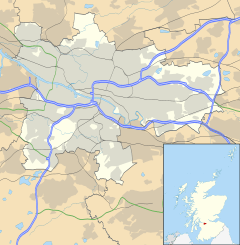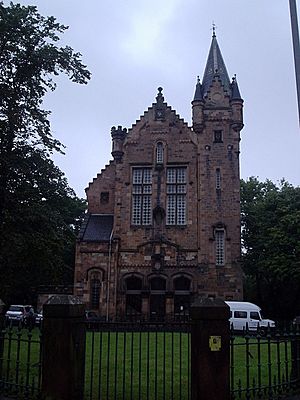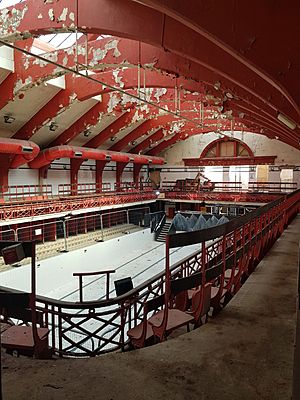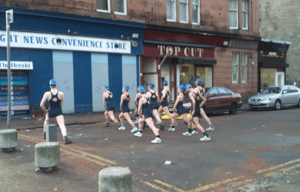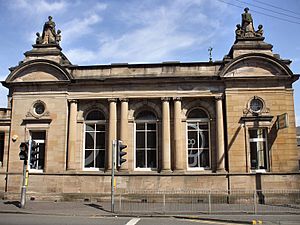Govanhill facts for kids
Quick facts for kids Govanhill
|
|
|---|---|
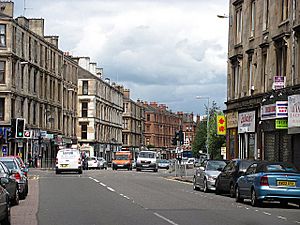 Cathcart Road |
|
| Area | 0.86 km2 (0.33 sq mi) |
| Population | 9,725 (2015) |
| • Density | 11,308/km2 (29,290/sq mi) |
| OS grid reference | NS585628 |
| Council area | |
| Lieutenancy area |
|
| Country | Scotland |
| Sovereign state | United Kingdom |
| Post town | GLASGOW |
| Postcode district | G42 |
| Dialling code | 0141 |
| Police | Strathclyde |
| Fire | Strathclyde |
| Ambulance | Scottish |
| EU Parliament | Scotland |
| UK Parliament |
|
| Scottish Parliament | |
Govanhill (which means Cnoc a' Ghobhainn in Scottish Gaelic) is a lively area in Glasgow, Scotland. It's located south of the River Clyde, surrounded by other well-known areas like Pollokshields and Queen's Park.
Long ago, Govanhill was part of a different region called Renfrewshire. For a short time, from 1877 to 1891, it was its own special town called a police burgh. This meant it had its own local government and police. But then, it became part of the bigger city of Glasgow. Today, it's part of the Southside Central area within Glasgow City Council.
Contents
Govanhill's Past: A Look at Its History
The story of Govanhill is closely connected to the Dixon family. A very important iron maker named William Dixon started large furnaces north of Govanhill. These furnaces were so famous they were called Dixon's Blazes.
William Dixon built a village for his workers right where Govanhill is now. This village was called Fireworks Village, and his workers lived there while working in his coal mine, the Little Govan Colliery. Govanhill officially became a town in 1877. You can still see the Dixon family's influence today, as the main street running through the area is called Dixon Avenue. Some other local streets, like Daisy Street and Annette Street, were even named after William Dixon Junior's daughters!
Becoming a Police Burgh
In 1877, Govanhill became an independent police burgh. This meant it had its own police force and local rules. A police office was built, complete with cells for prisoners, homes for police officers, and stables for horses. Govanhill even shared a special town hall with its neighbor, Crosshill. This building is now known as Dixon Halls.
However, as Glasgow grew bigger, both Govanhill and Crosshill became part of the city in 1891. As more buildings were constructed, Govanhill grew closer to its older neighbor, Strathbungo. To serve the growing number of people, a secondary school, a fire station, and a police station were built. These buildings were designed in the same sandstone style as the homes around them. Many of these old buildings are still standing today, though they are used differently. For example, the old school is now a primary school called St Brides Primary.
Govanhill's Buildings: Architecture and Changes
Saving Old Buildings from Demolition
In the 1960s, the city of Glasgow had a big plan to tear down many old buildings in inner-city areas. They wanted to replace them with new, tall buildings and move people to new neighborhoods on the edge of the city. This plan was called 'Comprehensive Development Areas'.
But Govanhill was one of the few areas that managed to avoid this huge demolition project. Instead of tearing everything down, the people living in Govanhill decided to take action. In 1974, they set up a community-based Housing Association. This group was run by the residents themselves.
Their goal was to improve the existing flats and add modern features, rather than knocking them down. They also carefully built new homes in empty spaces. Because of this community effort, Govanhill was able to keep its beautiful old buildings, most of which were built between 1890 and 1912. Some of these buildings were even designed by famous Scottish architects like Alexander "Greek" Thomson and James Robert Rhind.
Govanhill in the 21st Century
Even with all the improvements, some of Govanhill's tenement homes (large apartment buildings) still needed work in the early 2000s. In some parts of the area, there were problems like poor-quality housing and too many people living in one place.
To help fix these issues, a special program was started in 2015. It focused on improving housing quality and making sure landlords were taking good care of their properties. As a result, many homes in Govanhill have been improved. This program is still ongoing, working to bring all properties up to modern standards and ensure they are managed responsibly.
Special Buildings to See
Govanhill is home to one of Glasgow's original Carnegie libraries. These libraries were built with money from a famous businessman named Andrew Carnegie. Govanhill Library was designed in a grand style called Edwardian Baroque by James Robert Rhind.
You can also find residential buildings designed by the famous architect Alexander "Greek" Thomson in Govanhill. He designed many important buildings in Glasgow, and some of his residential works, like those on Garturk Street, Allison Street, and Daisy Street, are still private homes today.
The Govanhill Picture House is a unique cinema built in 1926. It has an Egyptian-themed design! While it's not currently in use, a local group called Glasgow Artists' Moving Image Studios (GAMIS) is working to bring this special cinema back to life for the local art scene.
Govanhill Baths is another important building. It was designed by A. B. McDonald and opened in 1917. It used to be a swimming pool, but it closed in 2001. However, the community fought to save it from being torn down. Today, it's a vibrant hub for community groups, offering health and wellbeing programs, from swimming classes to art and ceramics groups.
Govanhill's Community: People and Diversity
New Arrivals and Rich Diversity
From the very beginning, Govanhill has been a welcoming place for people moving to Glasgow and Scotland. The population has always been changing and becoming more diverse as people from different places have chosen to live here.
- First, people came from other parts of Scotland, like the Highlands and Lowlands.
- Then, workers arrived from England to help with the iron works.
- Many people also came from Ireland, especially County Donegal.
- Later, Italians and Jews fleeing difficult situations in Eastern Europe settled here.
- More recently, people from the Punjab and other parts of the Indian sub-continent have made Govanhill their home.
- Glasgow's newest communities, including former asylum seekers and refugees, have also found a home here.
- Since 2004, many people from countries like Poland, Slovakia, the Czech Republic, Romania, and Bulgaria have moved to Govanhill.
This mix of cultures makes Govanhill Scotland's most diverse neighborhood. About a third of the people living here are from different ethnic backgrounds. You can see this amazing diversity in the local shops, hear different languages spoken on the street, and meet people from all over the world. One survey found that people from 52 different countries speaking 32 different languages lived in just a few blocks in Govanhill!
Community Challenges and Improvements
Because so many people live in Govanhill, especially in the southwest part, it's one of the most crowded areas in Scotland. This can put a strain on local services and sometimes lead to community challenges.
However, many groups are working hard to improve the area. For example, since 2013, Govanhill has seen a big drop in crime, making it a safer place to live. While some parts of Govanhill still face challenges, there are many efforts to make the neighborhood better for everyone.
Fun Things to Do in Govanhill
Govanhill has a lively arts community! You can find dance studios, and many art activities happen at Govanhill Baths. There are also studios where visual artists create their work. Since 2009, Govanhill has even had its own arts festival called Streetland, which takes place in the streets and venues across the area. The Govanhill Housing Association also organizes a fun day for local residents every year.
There are many volunteer groups in Govanhill working to make the community better. They help improve the environment, create activities for young and old, encourage people from different backgrounds to connect, support the arts, and offer educational opportunities. There are lots of ways to get involved and volunteer locally!
Govanhill is also famous for its unique shops, which show just how diverse the area is. You can find businesses that help people send money or goods to other countries, travel agencies, and clothing and food stores from all over the world. There are also traditional shops like cobblers (shoe repairers) and cafes.
Govanhill International Festival and Carnival
One of the most exciting events is the Govanhill International Festival and Carnival. It started in 2017 and happens every year. It's a big celebration of culture with live music, historical events, food, and educational activities. The festival ends with a colorful carnival parade! This amazing event is organized by the Govanhill Baths Community Trust.
Who Represents Govanhill?
Here are some of the people who represent Govanhill in government:
- Member of Parliament (MP): John Grady (Glasgow East)
- Member of Scottish Parliament (MSP): Nicola Sturgeon (Glasgow Southside)
- Other MSPs for the Glasgow region: Patrick Harvie, Pam Duncan-Glancy, Pauline McNeill, Anas Sarwar, Sandesh Gulhane, Annie Wells, Paul Sweeney
- Glasgow City Council Ward 8 - Southside Central Councillors: Alexander Belic, Baillie Elaine Gallagher, Baillie James Scanlon, Baillie Soryia Siddique
Famous People from Govanhill
Industry
- Charles Frank (1865–1959), who made optical and scientific instruments.
- Sir Monty Finniston (1912–1991), an important industrialist.
The Arts
- C. P. Taylor (1929–1981), a playwright.
- Hannah Frank (1908–2008), an artist and sculptor.
- Jack Milroy (1915–2001), a comedian.
- Mohammad Akhtar (MC-VA) (1986–), a musician.
- Robbie McCallum (1967–), a screenwriter.
Sport
- Dan Drummond (1891–1949), footballer.
- David Davidson (1934–), footballer.
- Jim Blyth (1890–?), footballer.
- Jimmy Speirs (1886–1917), footballer.
- Jimmy Mallan (1927–1969), footballer.
- John McGeady (1958–), footballer.
- Bobby Collins (1931–2014), footballer.
Medicine
- Dame Katherine Christie Watt (1886–1963), a British military nurse.
- R. D. Laing (1927–1989), a psychiatrist.


